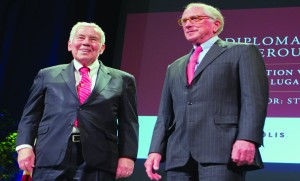Former Senators Richard Lugar (R-Ind.) and Sam Nunn (D-Ga.) spoke at the “Diplomacy in a Dangerous World” conversation at the University of Indianapolis on Feb. 25 in Ransburg Auditorium. Hoosier native Steve Inskeep, host of National Public Radio program “Morning Edition,” moderated the conversation.
Registration for the event was full weeks in advance, with about 750 people attending. According to President Robert Manuel, the event was made possible through many different partnerships.

(Photo by James Figy)
“The Hoosier hospitality and the spirit of convening is so strong here. And tonight is a real example of that—of the ability for people to come together to talk about problems that impact our world,” he said. “It is a special night.”
Before the event, a reception was held for the senators in the Norman L. Terry and Dorothy Wonnell Terry Atrium in Esch Hall, with nearly 150 people attending. Hors d’oeuvres were served, along with beer and wine. This was a first for Polk Food Services, which purchased a temporary alcohol permit for the event.
At the start of the conversation, Manuel welcomed everyone, and welcomed Lugar back to UIndy.
“I use the phrase ‘welcome back’ because after he left the Indianapolis mayor’s office in 1976, he taught political science here before winning his senate seat,” he said. “In fact, I’m told that he watched the returns to that senate election in the basement of the president’s house, where I now reside.”
After Manuel, President and Chief Executive Officer of WFYI Lloyd Wright spoke about his station’s relationship with UIndy, then introduced Inskeep.
Before showing a video that highlighted the senators’ careers, Inskeep said that both Lugar and Nunn are unique individuals.
“These are gentlemen who are deeply respected for their intellectual ability and their commitment to their country, despite having served a long time in the United States Congress,” he said.
A central part of the discussion was the 1992 Lugar-Nunn bill that helped reduce the nuclear stockpiles in the former Soviet Union after its fall. Nunn said that the United States then purchased the uranium from the dismantled weapons and degraded it to a lower level of enrichment for use in power plants.
“If you look at the electricity in the United States, 20 percent of it is nuclear. Fifty percent of the fuel burned over the last 20 years has been from that source. So 10 percent of all the electricity for the last 20 years has come from the weapons that were aimed at us during the Cold War,” Nunn said. “I consider that a parable of hope.”
According to Nunn, he went on a NATO trip a few years after graduating from college. That trip, which took place during the Cuban Missile Crisis, was when he realized the nuclear threat.
“It dawned on me at age 24 that the world was very close to [nuclear] holocaust, something unimaginable,” he said.
Lugar said the reason that the bill was so important was that so many American lives were at risk for years because of the Soviet Union’s nuclear weapons. He described one trip to Russia when he went down into a missile silo to inspect it.
“On the walls around the tables … were pictures, beautiful pictures, of American cities. These were identified as targets,” he said. “Now I thought, all the time that I was the mayor of Indianapolis … we were targeted. We could have been obliterated.”
Since many of those dismantled weapons were retrieved from the Ukraine, Inskeep asked the senators about the current state of that country.
Nunn pointed out that many Ukrainians who are ethnically Russian feel that they will be discriminated against if the country allies more with the West than with Russia.

(Photo by James Figy)
Fiyinfolu Arotiba, a master’s student in international relations, said that the senators’ depth of knowledge made the event very memorable.
“The discussion was interesting and very informative. It was an honor to listen to two well-respected and distinguished United States senators have such an intelligent conversation on their long-standing service to the nation in the area of nuclear security,” he said. “The nuclear threat reduction programs have definitely made the world a safer place, and we owe this to them.”
Sophomore international relations major Allie Kast said that the event was one of the best she had ever been to on campus, because it explored past, present and possibly future nuclear conflicts.
“Not only did it highlight the outstanding achievements of two of the longest-serving United States senators, but it also put light on what is currently being done in our global sphere to put an end to nuclear arms,” she said. “Both, Lugar and Nunn, respectfully acknowledged the problems and answered all questions asked.”
Lugar said that whenever he visits Indianapolis it always feels like coming home, since his family still owns its farm in Decatur Township. However, he has been enjoying his time in D.C. when he gets to teach and advise the student interns in The Richard G. Lugar Academy’s Washington Semester program.
“We had 10 interns this last semester, three this semester. Most have been in congressional offices. Two of the three are this time,” he said. “… I meet with them a couple of hours each Friday morning, as a rule, for question and answer sessions or … to share views on what’s going on in the world.”







